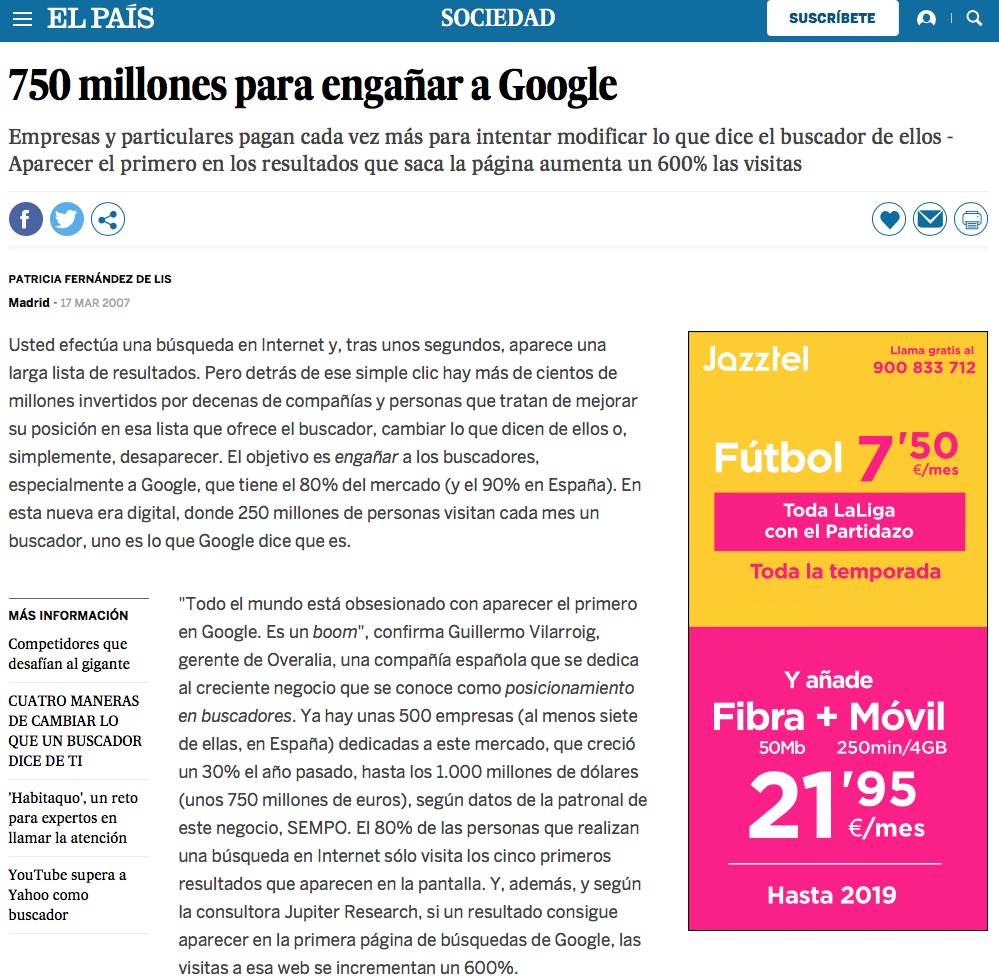Written by Fernando Maciá
Índice
- First prejudice: a search engine should be able to rank results in order of relevance in an infallible and absolutely objective way.
- Second bias: a search engine can unerringly identify the quality of a given content to perfectly calculate its relevance.
- Third prejudice: search engine optimization (SEO) is essentially about tricking search engines.
- Fourth prejudice: search engine results are easily manipulated.

First prejudice: a search engine should be able to rank results in order of relevance in an infallible and absolutely objective way.
This is impossible by definition, since there is no such thing as absolute objectivity: what order of results should Google return if I search for “democratic countries”, is the United States with its Guantanamo prisons more democratic than Spain with its monarchy or the United Kingdom with its House of Lords, which is the most democratic country in the world, and the second, and the third? Or maybe by searching for “democratic countries” I was trying to introduce the same shade of irony and sarcasm as if, when saying the phrase in conversation, I were to say “democratic countries” while indicating the quotation marks with the fingers of both hands. When we ask a search engine to return objectively ordered results, we are asking it not only to interpret our words, but also to interpret our thoughts, our prejudices, our emotions and our shortcomings. From all points of view, something beyond the reach of technology today.
Second bias: a search engine can unerringly identify the quality of a given content to perfectly calculate its relevance.

- That the main financial institutions are not bothering to adapt their content so that Internet search engines are able to “understand” the content of their pages.
- Or that Google is unable to rank the different results with the right relevance every time
In practice, the fact that Google’s results for this search do not match the positioning of companies related to that topic in the “real world” represents a dysfunction that does not benefit the search engine itself (users may judge that it does not return relevant results), nor the users (who do not get the results they expected) nor the companies that should occupy the top positions (who are missing a business opportunity by neglecting the way search engines classify web content). But to think that good content should be in first place for its own sake is as naïve as believing that
the good cloth in the ark sells itself.
. Marketing, advertising and public relations exist because, in the capitalist world, in addition to being good, you have to look good. Companies invest huge amounts of money to look good. The same is true in the world of search engines. It is not enough to have good content. You have to have good content and you have to make it so that it can be judged as good by a highly evolved computer program, but still lacking human-like intelligence. SEO professionals are essentially concerned with making good content visible to search engines.
Third prejudice: search engine optimization (SEO) is essentially about tricking search engines.
Says the article in question:“Objective, to trick Google into highlighting your good and hiding your bad.”. Or what are political programs, curricula vitae, advertising campaigns, public relations, politeness or the subtle art of seduction? Is it bad to try to highlight the good and hide the bad? Search engine optimization today is essentially about ensuring that search engines will be able to see all the contents of a web site and rank them in the relevant result categories and with the relevance that corresponds to them. This is an objective where search engines, portal owners and users have a lot to gain. As in all sectors, there are those who, taking advantage of the loopholes left open by the automatic search engine ranking process, temporarily manage to place certain portals well above the place that would correspond to them. Fortunately, the increasing improvement of search algorithms on the one hand, and the greater specialization of professionals who carry out optimization tasks while respecting the limits imposed by search engines, on the other, are making this temporary advantage increasingly difficult and risky to achieve. The fact that a given search does not return the results that we could judge as most relevant in a natural way is not so much due to an alleged “cheating”, of those that the author of the article says “make money”, but to a lack of interest of the real leaders of this sector to understand what are the habits of their potential customers on the Internet (using search engines as the first option) and the minimum requirements that search engines need to properly classify a website. In terms of economic capacity, quality of content, programming, architecture and design, the “big players” in each sector are in the best position to naturally occupy the leading positions in search engine results in each of their market niches. All they need to do this is to employ the right media, resources and professionals in the same way they do in advertising and marketing in the offline world.
Fourth prejudice: search engine results are easily manipulated.
If this were the case, there would be many more people in this sector. According to the article, it is enough to“bombard Google to make it say what they want it to say“. Optimization work, on the other hand, is a complex and multidisciplinary process, combining the work of programmers, linguists, copywriters and marketing consultants. When asked about how people are interested in the services or products of companies on search engines, optimization brings the language of portals closer to the language people use on a daily basis. It generates new content to respond to changing user interest and ensures the relevance of the best content for each search, moving artificially positioned content to irrelevant positions. By identifying the entire industry as a whole due to the malpractice of a few, the author of the news item slips in the headline a negative value judgment that is not reflected either in the body of the article or, of course, in the daily work of most search engine optimization professionals. (which, by the way, are more than the seven companies that are part of SEMPO, as demonstrated by the more than 450 people who attended the recent OJO Buscador 2.0 Congress in Madrid).



